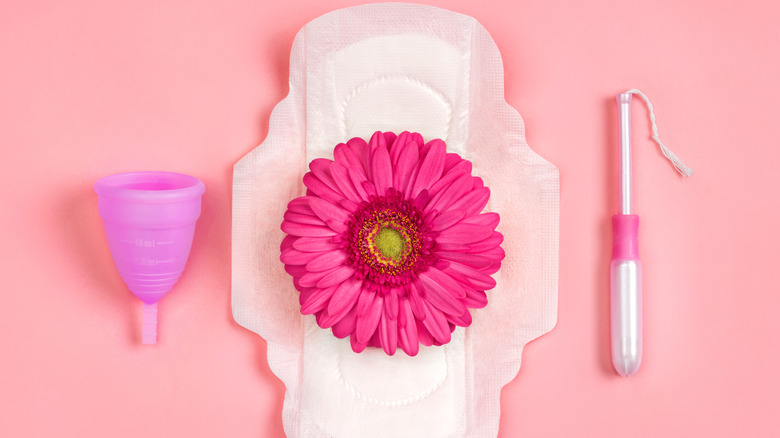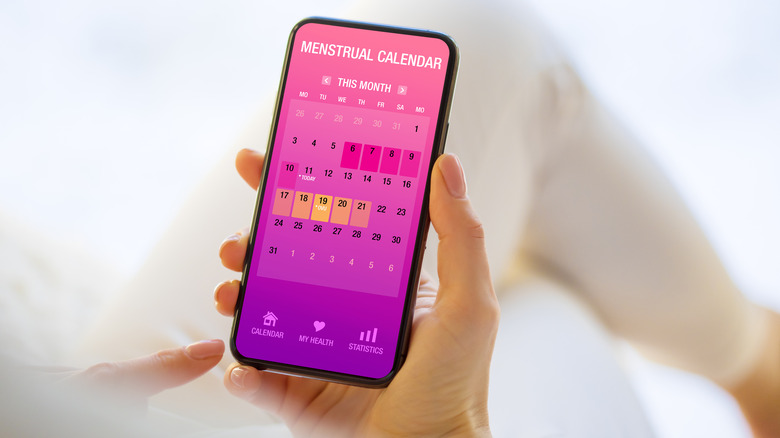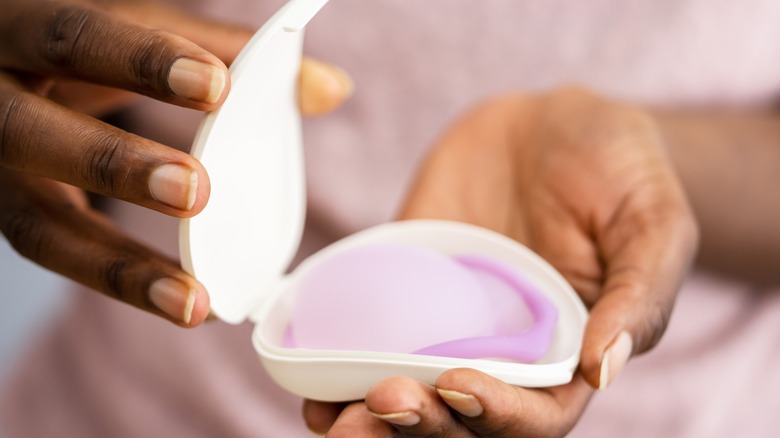Is There A Way To Put Your Period On Pause?
There's probably not one woman on the planet who hasn't had a time when she wished that she could push her period back a few days. Maybe it was due to an already planned vacation, or because of her upcoming wedding day and/or honeymoon. Maybe it was because she had a long couple of days at work to look forward to, and the fewer distractions she had to deal with, the better.
And while most of the time when we find ourselves feeling this way, our response is to simply "suck it up and deal," did you know that there are some ways that you can actually delay your cycle for a little while?
Before getting into how you can make this happen, there are some key things you should know. First, as we'll see, methods to delay your cycle do require knowing when it's expected to arrive (which may be difficult for the reported 14-25% of women who experience irregular periods). Second, if you Googled ways to delay your period and noticed all kinds of natural remedies — like eating gelatin, drinking apple cider vinegar, and overexerting yourself with exercise — most of them are not usually backed up by science or medical professionals, so you should probably take a pass on those (via Healthline).
With those points out of the way, let's discuss what actually has been proven to work. While you shouldn't rely on these methods on a monthly basis, they can actually come through for you in a pinch. So, are you ready to learn how to push your period back a day or two? Let's see.
There is a solid scientific purpose behind your period
Before discussing how to delay your period, it really should go on the record that no matter how much your menstrual cycle may drive you up the wall sometimes, it does indeed serve a purpose. Ever since puberty, an egg has released itself from one of your ovaries. If it doesn't get fertilized with sperm, the uterine lining that would be used to nourish your growing embryo then sheds every 21-35 days. And that is what's known as your period (via Healthline).
Although Mayo Clinic notes that things like fluctuations in your hormones, fibroids, health issues like polycystic ovary syndrome (PCOS), drastic changes in weight (up or down), and birth control can all play a role in how your menstrual cycle functions, so long as you're not going through menopause, you should expect a period on a consistent basis (or if that's not happening, speak with your doctor as soon as possible).
During your period, blood flows for 2-7 days, and it's common to lose about 2-4 tablespoons of blood, although this varies (via Healthline). Again, periods can be annoying and even inconvenient at times, but having one is a totally normal part of reproduction. So every month that your period shows up, choose to see it as a good thing.
Risks to consider before intentionally delaying your period
Since your body is designed to have a menstrual flow, if you decide to intervene with Mother Nature, it's important that you know that there are some potential risks that could come with doing so. This is mostly the case because, in order to effectively delay your period, some form of medication is usually involved and that can bring along with it all kinds of side effects including bloating, nausea, breast tenderness, and even a lower libido. Not only that, but putting your period on pause could also result in you experiencing breakthrough bleeding, or you could possibly even end up getting pregnant (via Medical News Today).
So again, while it may seem pretty awesome on the surface that you are able to delay your cycle, it really is a good idea to discuss your intentions with your physician beforehand, just so that you can have as much information as possible about what you're actually signing up for — before you actually do it.
Skip out on your placebo week of birth control
OK, so now that you know a little bit more about what could come with delaying your period, let's discuss some ways to do it. A very popular one is choosing to skip out on the placebo pills that come in your birth control pack.
According to Healthline, your birth control pills likely come in a pack of 28 — 21 are full of active hormones, and seven are known as "inactive," or placebo pills. When you take the placebos, they make it possible for you to have a menstrual cycle. So, if you want to delay your period, what you would need to do is skip the placebo pills altogether and continue with a new pack of pills so that you can keep taking ones that have the hormones in them. This works because so long as the hormones in the pills are active in your body, your period isn't triggered.
Since doing this will cause you to use more "active pills" than usual, and also because you will constantly have an upsurge of hormones in your system, be sure to discuss this with your doctor first. But if you're looking for a relatively easy way to delay your period (and you're already on the pill), this would be it.
Consider getting a vaginal ring
Another fairly popular form of birth control is a vaginal ring. Healthline shares that it's a prescription-only ring that is around 2" in diameter that you insert into your vagina. The ring releases the hormones estrogen and progestin into your system, which help to keep your ovaries from releasing eggs, and also thicken your cervical mucus so that sperm is not able to fertilize an egg (should one happen to drop).
As far as pros and cons go, vaginal rings are super effective and tend to make your periods shorter and lighter. On the flip side, they can come with mild side effects (that oftentimes mimic PMS) and can sometimes irritate your vagina.
If you want to use a vaginal ring to delay your cycle, a lot of pre-planning has to transpire. That's because a vaginal ring has to have been in your body for at least a month prior to the month when you want to push your period back. Also, similar to birth control pills, you have to remember to take the ring out on the first day of the fourth week and immediately replace it with another ring, so that the hormones preventing menstruation can remain at the same level (via Verywell Health). This is another method that could lead to light spotting. It's also one that your doctor needs to be made aware of, just to be on the safe side.
Ask your doctor for a norethindrone prescription
Something that is used to treat endometriosis and abnormal bleeding is a prescribed medication called norethindrone. It works thanks to the active ingredient progestin, which stops the lining of your uterus from developing; it also thickens your cervical mucus, making it challenging for sperm to enter into your uterus.
Another way that norethindrone is used is if you want to delay your cycle. If this is the case, your doctor will prescribe enough pills for you to take 5 milligrams, three times a day. Typically it is recommended that you start taking the pills 3-4 days before you expect your cycle to start, and your period will return approximately 2-3 days after you stop taking your prescription.
Although norethindrone is considered to be safe for the most part, some potential side effects include breakouts, breast tenderness, weight changes, sleeplessness, and nausea. It's definitely an approach that needs to be used at a minimum, but it can help you out if you're not on birth control and you're looking for a semi-last-minute alternative.
Up your doses of ibuprofen
Another way to delay your period that doesn't require a prescription at all is taking ibuprofen (via Cleveland Clinic). The ingredients in this kind of over-the-counter medication work as an anti-inflammatory, and when anti-inflammatories are in your system, they decrease the amount of prostaglandins (a natural chemical) in your system. When that happens, your uterus doesn't contract nearly as much, which means your uterine lining ceases to shed.
For this to work, you would need to take around 800 milligrams of ibuprofen every six hours (absolutely no more than that, though) a couple of days leading into your scheduled cycle. It's also important to keep in mind that this will only pause your period for a day or two. But probably the most important thing to keep in mind is that, usually, upping ibuprofen is best for decreasing the flow of a heavy period (it can cut them down by 10-20%). Also, you should never attempt to do this without speaking to your healthcare provider first. Still, if you're in a bit of a bind and manipulating birth control isn't what you'd prefer to do, ibuprofen is another method that's been tried — and has worked for some — before.
Orgasms MIGHT shorten the length of your period
Period sex really deserves its own article. That's because it is able to do things like help to decrease menstrual cramp discomfort, soothe headaches, and provide additional vaginal lubrication (via Healthline). However, the reason why it gets an honorable mention here is because, although it can't exactly delay your period, it could help to shorten it. Here's how: According to Healthline, something that periods and orgasms have in common is they both need your uterus to contract for them to happen. Keeping this in mind, if you experience orgasms during your cycle and your uterus contracts, that can help your uterus to shed your lining faster.
So, while this would be more of a "reactive" than "proactive" approach to your cycle, if you're looking for a way to cut your period short, climaxing could help to make that happen. And since orgasms can also improve your mood, help you to sleep better, and bring you closer to your partner (via Health), it might just be the best suggestion yet!







